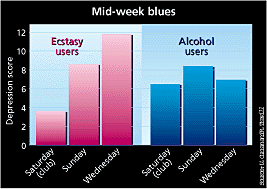The following is a facsimilie of an article appearing in
NEW SCIENTIST magazine on June 21, 1997.
For more information please visit the NEW SCIENTIST website at the URL:
http://www.newscientist.com/
After the rave,
the Ecstasy hangover
By David Concar
a weekend dose of the drug Ecstasy can lead to forgetfulness, poor concentration and mid-week blues severe enough to qualify the sufferer for clinical treatment, claim British researchers.
Valerie Curran of University College London, who has studied depression, attention and memory in users of Ecstasy, formally known as 3,4-methylenedioxymethamphetamine or MDMA, says that the drug's aftereffects are worse than those of drink. The depression suffered by Ecstasy users is deeper, takes several days to surface and lasts longer, she reports in a paper to appear next month in the journal Addiction.
In another study, which has not been published, Andrew Parrott and his colleagues at the University
And a third study, also unpublished, strengthens that link by screening out the effects of other drugs such as LSD, amphetamines and cannabis. Michael Morgan and his colleagues at the University of Wales, Swansea, compared two groups of Welsh drug users with a control group of people the same age. The two drug groups matched each other for consumption of most drugs, but only one took Ecstasy. In most tests, the three groups performed similarly, indicating that Ecstasy users are no less intelligent than the norm. But the Ecstasy group performed markedly worse in memory tests.
The psychological consequences of taking Ecstasy have been hotly debated for years. In 1992, researchers in the US tested long-time users and found some evidence of forgetfulness but none of depression. However, that study involved no control subjects and looked only at people who had not taken the drug for two months. It made no attempt to monitor clubbers as they come down from a Saturday night "high".
Curran addressed that issue by setting up makeshift psychology lab in a London club, helped by research student and part-time DJ Ross Travill. On successive Saturday nights, the researchers recruited a dozen clubbers who claimed they had taken Ecstasy that evening and a dozen who said they had only drunk alcohol. Volunteers completed a round of mood and memory tests in the lab at the club, and were tested again at their homes the next day and the following Wednesday.
One test involved counting backwards in sevens from a three-figure number, a standard way of probing "working memory" and ability to concentrate. In the club and the following day, Ecstasy users did almost twice as badly as the alcohol group. By Wednesday, the scores were closer but the alcohol group still did better.
But the biggest differences emerged with the mood tests. The day after clubbing, those who had stuck to alcohol were just as irritable, depressed and anxious as those who had swallowed Ecstasy. But by Wednesday, the drinkers had snapped out of it while Ecstasy users had slid deeper into depression. On average, their mid-week scores for irritability and restlessness were 50 per cent higher and their anxiety ratings double those of the alcohol group.
"There was enormous variation," says Curran, "but some of these people would have qualified for antidepressants." In a subsequent study not included in the Addiction paper, Curran has evidence that the depression lifts when clubbers skip their usual Saturday dose of Ecstasy.
In the study led by Parrott, Ecstasy users proved especially bad at remembering words. In one test, 15 words appeared in middle of a computer screen, one after the other. Afterwards, subjects were told to write down as many as they could remember. Several days after a night out clubbing, regular Ecstasy users typically recalled about 30 per cent fewer words than those who said they had never taken the drug. Parrott says that this is "obviously worrying given the widespread use of MDMA among the young".
Some other researchers argue that the new data are inconclusive. One major flaw is that none of the three teams could be absolutely certain what drugs their subjects had taken, as they did not perform urine tests. Nicholas Saunders, an independent researcher based in London who has written a book about Ecstasy, argues that many of the observed memory problems could be due to cannabis use.
The psychologists themselves caution against alarmist interpretations. "The effects we're seeing are mild but could cause problems for students taking exams," says Curran.
Why Ecstasy should cause mid-week depression or impair memory is far from clear. Animal studies indicate that Ecstasy can reduce levels of serotonin, a brain chemical which helps control moods, impulses and a range of other behaviours. But George Ricaurte of Johns Hopkins University in Baltimore doubts this holds the key to the mood swings. "The serotonin depletion persists, whereas the mood problem improves," he says.
Further information
|
© Copyright New Scientist, IPC Magazines Limited 1997
 of East London and Keith Wesnes of Cognitive Drug Research, a company in Reading that tests the effects of drugs on memory and learning, have evidence of link between memory impairment and Ecstasy.
of East London and Keith Wesnes of Cognitive Drug Research, a company in Reading that tests the effects of drugs on memory and learning, have evidence of link between memory impairment and Ecstasy.